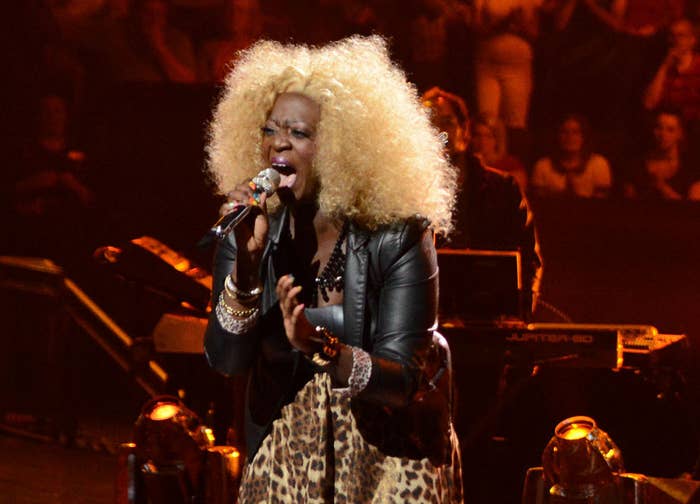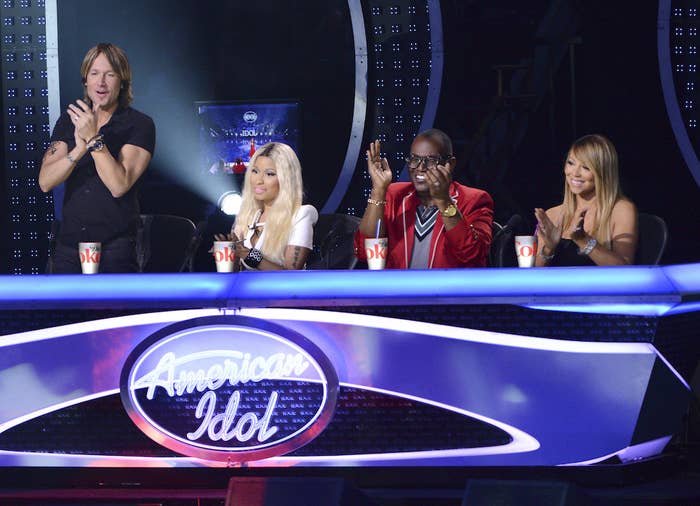
Last night was not a good night for American Idol. Ten male contestants sang for five slots in the semi-final top 20, and maybe three of them gave something close to a decent performance. The rest delivered a string of sleepy, off-key ballads that didn't even have the decency of being interestingly bad. It was a disastrously dull two-hour slog, and it could not have come at a worse time for the show.
The previous night's episode marked Idol's lowest rating (3.8) among 18- to 49-year-olds since 2003, falling just behind Modern Family in overnight numbers with 13.1 million people tuning in. (By comparison, in Season 9, just three years ago, a roughly comparable episode was watched by 24.2 million people, with a 13.4 rating.) At least Wednesday night featured the bizarre spectacle of Zoanette Johnson unhinging her jaw and devouring Keith Urban whole while bellowing The Lion King's "The Circle of Life." By comparison, Thursday's biggest performance was Mariah Carey's voluminous Bond girl hair.
If, years from now, you wanted to point to the week that Idol officially relinquished the mantle of The Biggest Event in Television and became Just Another TV Show...well, this could be that week.
But to be honest, the concept of American Idol as an unstoppable cultural juggernaut died on May 26, 2010, at the end of the aforementioned Season 9. That's the day judge Simon Cowell left the show to bring his own singing competition series The X Factor to the U.S., which presaged the sudden flood of singing competition shows that would saturate the TV market the following year and dilute Idol's potency as the only game in town.
It's also the day the fantastically mediocre Lee DeWyze was voted that season's champion over the self-evidently superior Crystal Bowersox, a singer-songwriter cut from the era of glam-eschewing female musicians who all too briefly took over Top 40 radio in the mid-'90s. It wasn't exactly easy to feel bad for Bowersox, however, since in person she gave off the overwhelming impression that the show was simply beneath her. It was the first season where the outcome didn't really matter all that much to anyone; by the end, the proceedings lurched forward with an almost funereal, just-let-this-thing-be-over-already quality. Suddenly, Idol felt irrelevant.
Since that day, the show has worked valiantly to burnish its brand as the premiere TV show to watch young people show off their vocal chords for texting tweens and dialing moms, while celebrity judges attempt to burnish their Q-score by offering sound-bite-friendly advice, admonition, and approval. And by the metric of the show's stated purpose — to find a viable music star in an industry starved for them — it has succeeded. While DeWyze was dropped from his label (and Idol's opening credits), Season 11's winner Scotty McCreary saw his first album go platinum, and last year's winner, Phillip Phillips, enjoyed genuine ubiquity thanks to his hit winning single "Home." (By contrast, none of the winners of The X Factor or The Voice have made any discernible mark, on the charts or otherwise. Can you even name any of them off the top of your head? I can't.) However, by the only metric that matters when measuring the success of a television show — the number of people who tune in — Idol's brand may be tarnished beyond repair.

Still, until Thursday night's sleepy train wreck of an episode, I was going to use this essay to discuss about how, in spite of its dwindling viewership, Idol hasn't been this good in years. I was going to point out how smart and funny Nicki Minaj has been as a judge; how unafraid she is to cut down bad performances and unabashedly boost ones she loves; and how at the taping of last week's Thursday night Sudden Death round, Minaj was by far the judge who received the most "I LOVE YOU!" audience shout-outs. I was going to marvel at how Mariah Carey gets out of her discomfort with saying mean things by filibustering with a litany of veteran showbiz know-how, astutely appraising the contestants' vocal choices, key changes, and presentational style. I was going to applaud Keith Urban for managing to stand out among the over-the-top personalities that surround him with a stealth sense of humor and keenly observed musical insight. And I was even going to begrudgingly acknowledge that Randy Jackson has, on occasion, stepped up his game with actual constructive criticism. It's true, y'all!
Indeed, after last week's taping in Las Vegas, executive producer Nigel Lythgoe told me backstage that he's been thrilled with how well the judges have gelled together despite all the Nicki/Mariah infighting that has won the show its only real media buzz this season. "There have been issues, which we've seen," he said, "but at the end of the day they were minor in comparison to the hours we've been together. We're together all day and all night for days. They've gelled in a strange little way. It is a dysfunctional family. They agree with each other or disagree with each other and feel comfortable to do that. They mustn't feel as though they can't say 'I disagree.'"
In fact, it's been the judges' willingness to call each other out — and to do so by expressing their thoughts in clear, articulate sentences (not a given for the Idol judges table) — that has made this season such an unexpected pleasure. "I think last year, everybody got the message that everyone was agreeing with each other too much," said music exec and official Idol mentor Jimmy Iovine last week. "You owe it to the people that you really like to let the people know that you're not as happy with [their performance]."
Still, amid the torpid wreckage of last night's episode, I'm left with the feeling that even Idol's strongest judging panel ever isn't enough to keep the show from getting in its own way. It was smart for the producers to jettison all the "waiting to hear the final verdict" episodes in favor of winnowing down the contestants by letting them perform on a live stage. "We wanted to do something that separated us from other shows," Lythgoe said last week. "And I think only Idol would get away with taking over the LOVE theater [at the Mirage Hotel and Casino], putting 1,500 people there, and eliminating people in front of them." But that's just it: Moving those performances to Las Vegas only added to the bigger-is-better bloat that has drained the show of much of its early charm.

That was no more evident this week than in the fate of 15-year-old Juliana Chahayed, who dialed down the Demi Lovato song "Skyscraper" into a lovely plaintive acoustic ballad. It demonstrated real musical imagination, but Chahayed looked so overwhelmed while performing it that both Minaj and Carey worried that she was too green for this season. So the judges sent her home.
Not being completely ready for the big time, however, used to be the point. Much of the fun of Idol was watching contestants like Kelly Clarkson, Carrie Underwood, David Cook, and Kris Allen grow their confidence and learn to flex their musicianship over the course of the season. They surprised us by getting better each week. But over the last few years, Idol seems fixated on finding "artists" who come to the show ostensibly ready to be signed right now — which sort of defeats the purpose of having a weekly competition in the first place. What makes this doubly odd is that after five years of white male guitarist winners, the producers are determined to have a girl win this season — and yet they also keep insisting on strict gender parity even when so many of the male contestants who made it through are less impressive than female ones like Chahayed who haven't.
Keith Urban seems to understand this; he praised Chahayed's potential after her performance, and appeared genuinely unhappy with having to send her home. Jimmy Iovine similarly told me last week that he thought Shubha Vedula — whose performance of Lady Gaga's "Born This Way" was imperfect but compelling — should have made the final cut because "she shows a lot of potential." Instead, the judges once more fell into a depressing Idol habit of making choices that had little to do with what we heard on the night and everything to do with previous performances we've barely heard at all. Some would even go so far as to say the all the choices were predetermined from the start, but I don't think that's the case: I watched the judges frantically and emphatically deliberate with Nigel Lythgoe for at least 45 minutes during last week's Vegas round for the guys, and I don't think they did it for their health. In any event, expect to hear a lot more comments like, "It's like we were at your concert!" and "You could have a hit with that on the radio right now!" — and very little "I'm so proud of how much you've grown!" and "I was not expecting that from you at all!"
Next week, Idol's 12th season faces its biggest obstacle yet: "America," i.e., the small percentage of viewers who bother anymore with voting for the contestants. "America" has to cut down the 20 remaining contestants to roughly 10 finalists, and if terrific singers with room to grow — like Devin Velez, Burnell Taylor, Kree Harrison, and Candice Glover — make it through, this will continue to be an Idol season worth watching. But if "America" goes for decent-to-questionable voices with "great stories," like Charlie Askew, Lazaro Arbos, and Zoanette Johnson, or beautiful dullards like Paul Jolley, Elijah Liu, and Aubrey Cleland, then we're all in for a looooong season indeed.
